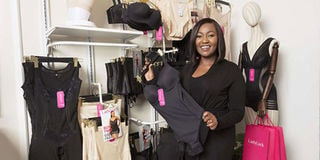'I found a niche in selling women shapewear'

Diana Ogendi is an owner of LadyLuck, a purveyor of shapewear for women – speciality bras, corsets, shaping panties and shorts, booty boosters and body suits. PHOTO | COURTESY
What you need to know:
- The pursuit to have a body part enhanced or compressed informs the values of Diana and Eddie Ogendi, the proprietors of LadyLuck Shapewear.
- Diana uses Kenyan models to showcase her shapewear as it is relatable to their market.
You and I – like all women – have a problem area on our bodies.
Stop any woman on the streets and she’ll tell you her struggles. It matters not her age or ethnicity – the struggle is shared. It’s our kinship.
We struggle with back fat, saggy breasts, love handles, potbellies, muffin tops, cellulite, dimpled thighs, a flat or wiggly bum, and straight hips.
I struggle with my mummy pouch - that flab between my belly button and Caesarean incision. I got it after delivering my daughter.
The pursuit to have a body part enhanced or compressed informs the values of Diana and Eddie Ogendi, the proprietors of LadyLuck Shapewear.
LadyLuck is a purveyor of shapewear for women – speciality bras, corsets, shaping panties and shorts, booty boosters and body suits.
The garments come in black and nude – colours that turn your body into a canvas for anything you want to wear.
THE RIGHT SIZE
I’m at LadyLuck’s Sarit Centre outlet. They opened it in September 2019. Their first outlet opened in March at 680 Hotel in Nairobi CBD.
The online outlet and warehouse still sit in Embakasi. They have a full-time staff of seven.
I tell Diana, “I bought a second-hand bodysuit but I don’t think it’s the right size. It flattens my mummy pouch but it’s tight and uncomfortable. I sometimes get headaches.” We chortle.
“It’s too small,” Diana offers. “Proper-fitting shape wear shouldn’t leave you with a headache.”
Diana and Eddie launched LadyLuck in 2013 from their bedroom at home.
For two years, they shared a work desk, two staff and a wheezing computer that dangerously overheated.
Their patience as new parents and a couple in full-time business was tested. Diana empathises with women’s body struggles.
“I had my son – Heri – in 2012. I resumed attending church regularly when Heri was a month old, but I couldn’t comfortably wear any of the fitting dresses I loved to wear before.
Everything was bulging out. I also had stretch marks and acne. Eddie suggested we buy shapewear he’d seen online. Wearing them gave me confidence – I looked and felt good. Eddie usually sees opportunity. I remember he asked, ‘Do you think other women will need it?’”
ENTREPRENEURSHIP
The family loaned them their starting capital. They began importing body suits in small batches, which they sold to their immediate social circles.
They had a return-and-exchange policy, one they still maintain to date. Feedback from this initial client base informed their decision to widen their offerings.
Diana isn’t a rookie in the unforgiving world of entrepreneurship. “I graduated from Daystar University in 2008 with a degree in public relations. I had a profitable side hustle while in campus selling second-hand bras, panties and swimwear. I wanted to work with a big PR firm after graduating but the job offers didn’t come.”
Diana opened a catering business from her kitchen called Debistro. She didn’t tell her parents about running Debistro.
“I was worried about what they’d think of their daughter – a graduate – hawking food to corporate offices in Upper Hill. They’d both been employed but they’d run a supermarket together as a couple. Surprisingly, my Dad told me to use what I’d learned in school to run the business,” the second of four kids says.
Debistro had a signature beef burger. Diana had ‘borrowed’ the recipe from Chef Gordon Ramsay on YouTube.
CHALLENGES
Diana gave too much attention to feeding her clients but not enough to Debistro’s margins and overheads.
The business folded in 2012. She says: “The brand had some valuable goodwill after those three years; I should have sold that goodwill. Eddie now does our accounting and I focus on creative tasks.”
Throughout 2013 to 2014, they ordered items online in small batches they sold through their Facebook page (@ladyluckshapewear).
Small batches were costly to import. Sometimes what they ordered wouldn’t be what they received. Other times they’d receive rejected merchandise.
Delays of clearing at the port became a jaded song. Diana took her first trip to Turkey in October 2014 to engage suppliers.
“We used to purchase from wholesalers but from 2016, we had the manufacturer make-to-order in large quantities. We still do custom orders and designs. For example, the earlier bodysuits were not made for women with wide hips. We tweaked the leg width to accommodate a bigger woman, and asked the manufacturers to make them from size eight to 24.
“We have manufactures in China, Turkey and UK. Our quality is consistent because we manufacture to European standards.”
NEW MARKET
Diana today is wearing a high-waist panty. It’s a sample she bought from one of her manufacturers; she’s testing it.
Diana does this with every item they stock – she’s essentially her own first customer. She gives me a peek. I ask, “What do you like and not like about the panty?”
“I like that; it’s soft and breathable,” Diana exhales. “I can’t feel it. It’s not digging into my waist, and I can’t see the seamless hems through my tights. What I don’t like is that it doesn’t come in bigger sizes. We’ll have to custom a bigger size.”
Diana uses Kenyan models to showcase her shapewear as it is relatable to their market. Relatibility sells.
“Since we opened the two outlets, we’ve engaged a new demographic of women in their 50s to 70s,” Diana says about scaling up. We’re now looking to retail in Mombasa.”





